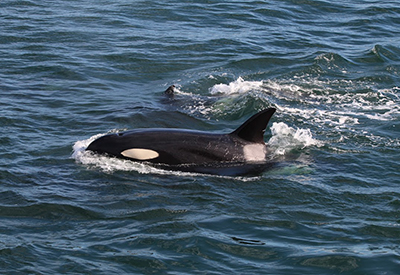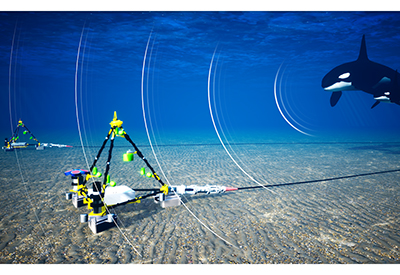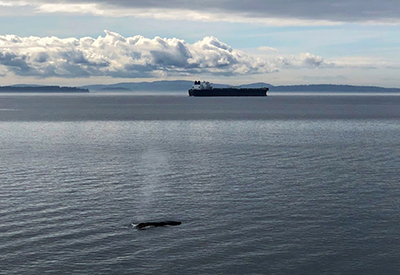TRANSPORT CANADA COMMISSIONS UNDERWATER LISTENING STATION IN THE SALISH SEA TO PROTECT ENDANGERED KILLER WHALES AND QUIET SHIPS

Dec 22, 2020
Environmental science and engineering company JASCO Applied Sciences recently developed and installed a world-class underwater listening station in the Salish Sea to track endangered whales and measure underwater noise emissions of thousands of commercial vessels that frequent B.C.’s southern ports. The station consists of two observation frames, each with eight underwater microphones, called hydrophones, installed 190 metres (620 feet) below the shipping lanes of Boundary Pass, about 50 kilometres south of Vancouver.
Commissioned by Transport Canada under the federal government’s five-year Whales Initiative, this $9.5-million listening station project aims to support the protection and recovery of endangered Southern Resident killer whales and to provide data to accurately evaluate noise-reduction technologies applied to ships. JASCO is operating the system and working with the Vancouver Fraser Port Authority-led Enhancing Cetacean Habitat and Observation (ECHO) Program to analyze and distribute the results.
 The Boundary Pass location was chosen because it is within critical habitat of the Southern Resident killer whales—a dwindled population of only 74 individuals at present—and is also a major thoroughfare for commercial vessel traffic. Positioned between the inbound and outbound shipping lanes, the observation frames use pyramid-shaped arrays of hydrophones to detect and triangulate the positions of calling marine mammals and ships transiting overhead. This ability allows counting of the individual calling animals within pods of whales passing the listening station.
The Boundary Pass location was chosen because it is within critical habitat of the Southern Resident killer whales—a dwindled population of only 74 individuals at present—and is also a major thoroughfare for commercial vessel traffic. Positioned between the inbound and outbound shipping lanes, the observation frames use pyramid-shaped arrays of hydrophones to detect and triangulate the positions of calling marine mammals and ships transiting overhead. This ability allows counting of the individual calling animals within pods of whales passing the listening station.
JASCO’s OceanObserver intelligent monitoring systems are the brains of the listening station. The devices are designed for acquiring and processing large volumes of acoustic data in real time on devices such as ocean gliders, buoys, and cabled observatories like the listening station. The OceanObservers are connected by 2.8 kilometres of subsea fibre-optic cables to a shore station on Saturna Island, transmitting over 1 terabyte of data to shore each day. The sound recordings, together with underwater video and oceanographic sensor data, are reported online in real time.
 Tracking endangered Southern Resident killer whales
Tracking endangered Southern Resident killer whales
The whale detection results include the species, locations, and travelling directions of the animals. These will help reveal the distribution and activity of animals in this area, including Southern Resident killer whales. In the future it is hoped these results will feed alert systems to notify approaching vessels when animals are present and in their path.
Between temporary recorders deployed since December 2018 and the cabled listening station that replaced them in June 2020, and with the support and participation of the BC Coast Pilots, the shipping industry and regional commercial vessel operators, the project has already obtained high-quality measurements of underwater noise emissions of over 10,000 ships.



























